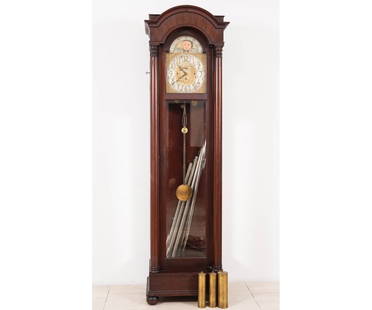
Translated Egyptian Faience Ushabti for An-mose
Similar Sale History
View More Items in Vases & Vessels
Related Vases & Vessels
More Items in Ancient Egyptian Vases & Vessels
View MoreRecommended Decorative Objects
View More




Item Details
Description
Ancient Egypt, Third Intermediate Period, 21st Dynasty, ca. 1070 to 943 BCE. A breathtaking example of a hand-built faience ushabti, standing in a dignified pose, that is enrobed in layers of incredibly lustrous, brilliant blue glaze. The figure presents in characteristic ushabti fashion by standing in mummiform with fused legs and feet, crossing both arms atop the chest with a pair of black-painted picks in his hands, and with a seed bag draped from both shoulders down to the middle of his back. The protruding visage exhibits gently modeled features like almond-shaped eyes outlined heavily with black pigment, a flush nose, a slender mouth with indented corners, and tall ears, all framed within the striated lappets of his tripartite wig. A faint column of hieroglyphic symbols atop the legs identifies the figure and reads, "For the instruction of Osiris, An-mose." Size: 1.65" W x 5" H (4.2 cm x 12.7 cm)
Shabti (or ushabti) dolls are figures shaped like adult male or female mummies wearing traditional ancient Egyptian headdresses. The ancient Egyptians believed that after they died, their spirits would have to work in the "Field of Reeds" owned by the god of the underworld, Osiris. This meant doing agricultural labor, which was required by all members of society, from workers to pharaohs. The wealthier nobility in Egyptian society were able to have shabtis made of coveted faience, and blue faience was meant to reflect the color of the river Nile both on earth and in the afterlife.
Cf. The Metropolitan Museum of Art, accession number 26.7.981
This piece has been searched against the Art Loss Register database and has been cleared. The Art Loss Register maintains the world's largest database of stolen art, collectibles, and antiques.
Provenance: private Toronto, Ontario, Canada collection, by descent, acquired in Egypt in 1894 to 1896
All items legal to buy/sell under U.S. Statute covering cultural patrimony Code 2600, CHAPTER 14, and are guaranteed to be as described or your money back.
A Certificate of Authenticity will accompany all winning bids.
We ship worldwide to most countries and handle all shipping in-house for your convenience.
#167179
Shabti (or ushabti) dolls are figures shaped like adult male or female mummies wearing traditional ancient Egyptian headdresses. The ancient Egyptians believed that after they died, their spirits would have to work in the "Field of Reeds" owned by the god of the underworld, Osiris. This meant doing agricultural labor, which was required by all members of society, from workers to pharaohs. The wealthier nobility in Egyptian society were able to have shabtis made of coveted faience, and blue faience was meant to reflect the color of the river Nile both on earth and in the afterlife.
Cf. The Metropolitan Museum of Art, accession number 26.7.981
This piece has been searched against the Art Loss Register database and has been cleared. The Art Loss Register maintains the world's largest database of stolen art, collectibles, and antiques.
Provenance: private Toronto, Ontario, Canada collection, by descent, acquired in Egypt in 1894 to 1896
All items legal to buy/sell under U.S. Statute covering cultural patrimony Code 2600, CHAPTER 14, and are guaranteed to be as described or your money back.
A Certificate of Authenticity will accompany all winning bids.
We ship worldwide to most countries and handle all shipping in-house for your convenience.
#167179
Condition
Repairs to areas of proper left foot and left shoulder, with chipping and light adhesive residue along break lines. Small areas of chipping and loss along repaired areas. Fading to black glaze, with minor pitting to some surfaces, and light encrustations mostly along verso. Stunning luster on remains of blue glaze, and wonderful preservation to overall figural form. Hieroglyphs are faded but are mostly legible.
Buyer's Premium
- 26.5%
Translated Egyptian Faience Ushabti for An-mose
Estimate $8,000 - $12,000
6 bidders are watching this item.
Get approved to bid.
Shipping & Pickup Options
Item located in Louisville, CO, usSee Policy for Shipping
Payment

TOP






































































